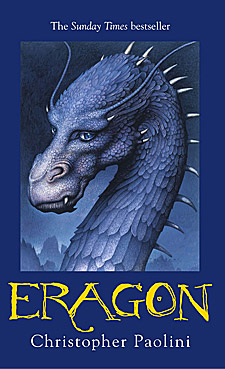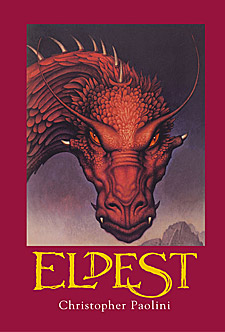It's easy to see why Eragon, has become a runaway success for emerging writer Christopher Paolini. The international best-seller is building on the foundations laid by J K Rowling's publishing phenomenon, the Harry Potter series, which in turn capitalised on ground broken by seminal works JRR Tolkien's The Lord of the Rings and CS Lewis' The Narnia Chronicles.
In every case minor individuals are called upon to rise above their unregarded states and achieve a profound deliverance as much for themselves as for the people around them. Small wonder that Christians have found fruitful ground for analogies to Jesus. Even less surprising is that film producers have recognized the maturing fantasy market and translated these epic coming-of-age tales to the big screen. Click here to read Andrew Robinson's excellent review of Eragon the film.
 In both the book and the film, Eragon is a teenage boy of uncertain parentage who has been raised by an uncle dedicated to the difficult life of tilling the soil. Eragon dreams of something more but all of the best adventures seem to have occurred a hundred years before his birth when the Dragonriders ruled the skies and dispensed justice to all and sundry. He lives in a darker age in which his town occupies an unregarded part of an uncaring empire. But his discovery of a dragon's egg, and the hatchling's choice to bond with him allows his dreams to take flight " literally " while plunging the empire into uncertain times. Will the Dragonriders return through Eragon and his dragon-steed Saphira, challenging the rule of the despotic King Galbatorix?
In both the book and the film, Eragon is a teenage boy of uncertain parentage who has been raised by an uncle dedicated to the difficult life of tilling the soil. Eragon dreams of something more but all of the best adventures seem to have occurred a hundred years before his birth when the Dragonriders ruled the skies and dispensed justice to all and sundry. He lives in a darker age in which his town occupies an unregarded part of an uncaring empire. But his discovery of a dragon's egg, and the hatchling's choice to bond with him allows his dreams to take flight " literally " while plunging the empire into uncertain times. Will the Dragonriders return through Eragon and his dragon-steed Saphira, challenging the rule of the despotic King Galbatorix?
A friend of mine says he has consciously given up on reading on the basis that if any creative work is really good someone will eventually make a film of it. But the book is likely to be the next natural step for young minds entranced by the adventures of Eragon and Saphira, and as many people have noted before me, there is often a vast distance between a cinematic work and a written one. This is nowhere more obvious than when Hollywood attempts to encapsulate a novel that is part of a series. Paolini has moved quickly to capitalize on his best-seller by publishing volume two, Eldest which covers the continuing training of Eragon and Saphira as they prepare to confront Galbatorix. Volume three of the Inheritance trilogy, covering the final battle of good verses evil is expected in 2007.
Like most fantasy lovers, I reveled in the idea of a new dragon adventure to fill up some quiet holiday hours. However I feel I owe it to the authors who have laid the groundwork for Paolini to note the contributions to his work. To be honest, Eragon is a stirring tale, but I think most fantasy readers would agree that Paolini has borrowed heavily " and not always successfully " the best elements of much better writers. His sentient dragons, and their telepathic bonding with their riders, is directly lifted from Anne McCaffrey's multi-volume Dragonriders of Pern series. His laws of magic and even the instruction of the young Eragon seem to be truncated versions of David Edding's six-part Belgariad, right down to the point that the teenager's mentor Brom seems to be a melding of Edding's sorcerer Belgareth with Tolkien's Gandalf. And this is probably where the worst violence to fantasy lore takes place. Paolini's elves and dwarves are stunted and improbable sketches of the great cultures created for The Lord of the Rings by a master word-smith. They lack the wisdom and depth with which Tolkien imbued them. Sadly the assemblage of these great fantasy elements is equally poor, so much so that his characters always seem on the verge of emotional collapse for inexplicable reasons. When someone informed me that Paolini had written Eragon when he was fourteen I was hardly surprised. The real tragedy is that young readers who are introduced to this genre by Paolini may never actually meet the masters who informed his work.
Thank you for indulging my rant. But the real question is, what has Paolini used these classic elements to communicate? As I mentioned, his fist volume is a fast-paced, if simplistic, coming of age piece that will appeal to a young reader's sense of adventure. But parents should be very concerned about the contents of the follow-up, Eldest. As you might garner from the references above, I have a fairly relaxed attitude to these modern mythologies. I think they provide fertile ground for young imaginations and can provide positive reinforcement of ideals and character types Christians hold dear. However I will not be passing the Inheritance series on to my sons.
 In Eldest Paolini spends dozens of pages taking deliberate swipes at the idea of organized religion. The elves, who are presented as the most advanced of all nations, undertake to educate Eragon in the realities of the universe. Arya, a key character, openly mocks the Dwarves for prayers she describes as "mutterings into the air' and challenges the money they have spent on monuments to their own "wishful thinking' when it could have been used to aid the poor. The criticisms appear quite valid " the Dwarves' religion is presented as an improbable account of creation combined with an irrational enslavement to a despotic god. All attempts to reason with the adherents of this belief system are met with tirades. "Without us, the crops would wither in drought," rants high priest Gannel. "Rivers and lakes would flood. Our flocks would give birth to one-eyed beasts. The very heavens would shatter under the gods' rage! Only our prayers and service prevent that from happening."
In Eldest Paolini spends dozens of pages taking deliberate swipes at the idea of organized religion. The elves, who are presented as the most advanced of all nations, undertake to educate Eragon in the realities of the universe. Arya, a key character, openly mocks the Dwarves for prayers she describes as "mutterings into the air' and challenges the money they have spent on monuments to their own "wishful thinking' when it could have been used to aid the poor. The criticisms appear quite valid " the Dwarves' religion is presented as an improbable account of creation combined with an irrational enslavement to a despotic god. All attempts to reason with the adherents of this belief system are met with tirades. "Without us, the crops would wither in drought," rants high priest Gannel. "Rivers and lakes would flood. Our flocks would give birth to one-eyed beasts. The very heavens would shatter under the gods' rage! Only our prayers and service prevent that from happening."
Worse still, the idea of the existence of a God at all is gently laughed to scorn. Eragon's greatest instructor Oromis, the Mourning Sage, explains that the elves long ago gave up trying to imagine supernatural answers for questions that would ultimately be answered by an increase in knowledge.
"In the millennia we elves have studied nature we have never witnessed an instance where the rules that govern the world have been broken. That is, we have never seen a miracle. Many events have defied our ability to explain, but we are convinced that we failed because we are still woefully ignorant about the universe and not because a deity altered the workings of nature."
In fact, Paolini goes as far as to have his elf philosopher enter into a debate with Eragon over what quality is to be prized above all else by those in power. Eragon makes the mistake of suggesting that morality or a sense of righteousness might be appropriate and has himself verbally rapped over the knuckles for his trouble.
"History provides us with numerous examples of people who were convinced that they were doing the right thing and committed terrible crimes because of it " On it's own, being a decent person is no guarantee that you will act well, which brings us back to the one protection we have against demagogues, tricksters, and the madness of crowds, and our surest guide through the uncertain shoals of life: clear and reasoned thinking. Logic will never fail you" "
And so on.
But probably the biggest shock for a fantasy novel is the adamant conviction that this world is all there is. Everything that might be considered to be outside of the control of humans has been single-mindedly drawn back within the bounds of science. The dragon Glaedr chides Eragon for considering that his life is any different than that of the insects around him.
"When flesh is destroyed, so is the soul," said Glaedr.
"But an animal isn't a person," protested Eragon.
"After your meditations, do you truly believe that any of us are so different from a woodrat? That we are gifted with a miraculous quality that other creatures do not enjoy and that somehow preserves our beings after death?"
"No," muttered Eragon.
On the whole, Eragon represents an interesting, if poorly written, distraction. Eldest, however, is a thinly veiled attack on religion in general, and some of the most important Christian doctrines in particular. If there is no God, there is no-one to be held accountable to. If there is only this life to be considered then morality does lose its meaning in the face of logic. However probably the best defense is Paolini's writing. The assaults mounted remind me particularly of the oh-so-informed but barely researched arguments I encountered in first year philosophy classess. His character's arguments are seldom challenged in any meaningful way. But this really shouldn't surprise us, and it certainly didn't surprise the Apostle Paul who was familiar with the attacks of a culture that valued the intellect over faith:
"For the message of the cross is foolishness to those who are perishing, but to us who are being saved it is the power of God."






















